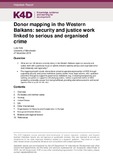| dc.description.abstract | This rapid literature review has found a variety of donors working on security and justice assistance in the Western Balkans. The most significant donors include European Union (EU) bodies and the United Nations Office of Drugs and Crime (UNODC). There is significant international cooperation between donors, regional coordination mechanisms such as the Western Balkan Integrative Internal Security Governance (IISG), and international bodies such as UNODC and the Organisation for Security and Cooperation in Europe (OSCE). Many donors, including the US, the EU and UN bodies, link their justice and security work with the region's targets for accession to the EU. Technical assistance to the police, judiciary and governments includes training and sharing of best practice regionally and with EU and international bodies. Work on trafficking of people is often part of programmes to make border control in the region more efficient. Work on serious and organised crime is sometimes linked with counter-terrorism and preventing violent extremism programming, as the two are seen to be linked. Work on the judiciary focuses on building capacity and making institutions more efficient, as well as strengthening the integrity and independence of anti-corruption processes. There is less evidence of programmes to help the victims of serious and organised crime, although this is included in many programmes on trafficking and border control. The review has found limitations within the available evidence. It has looked for programmes focused on security and justice, including technical assistance, upstream support to governance institutions and prevention work and support to victims. It has not always been possible to find detailed budgets and programme mapping. An evaluation of the Western Balkan Integrative Internal Security Governance (IISG) notes that, although its role is partly to coordinate programmes in the region, there does not as yet appear to be a systematic mapping of programmes (UNODC, 2017, p. 33). This review has focused on programming in the categories including rule of law, policing, judiciary, serious and organised crime, and border control. However, aid reports and statistics are not always broken down in the same categories. A country may spend money on judicial reform in the Western Balkans, but it is not always possible to infer how much, if any, of this would be aimed at combatting serious and organised crime directly. The review has focused on current and recent programming. Some earlier missions are included. For instance, the European Instrument for Pre-Accession II (IPA II) runs from 2014-20, so programmes running in 2014 are included, for instance, as they are part of the most recent iteration of the instrument. Sources used include annual reports from donors, evaluations and websites setting out programmes. The review is gender- and disability-blind. | en |

